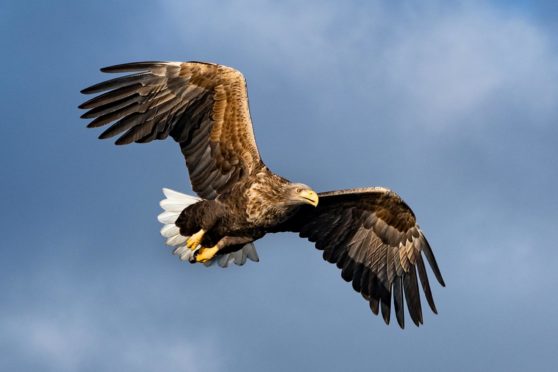A pair of sea eagles have successfully bred in Deeside for the first time in around 200 years.
Two chicks were hatched after the birds nested on the Mar Estate.
Although sea eagles have been sighted in the north-east for several years, this is the first successful breeding attempt recorded.
Given the areas royal connections, the two chicks have been named Victoria and Albert.
The pair at Mar Lodge are one of five across the Cairngorms National Park. Two other pairs in other parts of the park have also successfully fledged young this year.
Mark Nicolson, a proprietor of Mar Estate, said “We are delighted to have successful breeding of sea eagles on the estate.
“Sea eagles have been present for several years, mainly providing spectacular aerial battles with our long resident golden eagles.
“Our hopes that they might settle and breed have been realised, and we look forward to their return next year.
“After some local input, we have named the young fledglings Victoria and Albert.”
The birds, also known as white-tailed eagles, are not thought to have bred in the north-east since the early 1800s.
The species became extinct in Scotland in 1918, however, after an absence of around 60 years, they were reintroduced in the west coast in 1975.
Sea eagles have also been introduced in Wester Ross and Fife, with the national population recovering to around 130 pairs.
The Mar Lodge pair is made up of a male released in Fife in 2011, while the female is believed to be from the west coast.
Shaila Rao, NTS Ecologist for neighbouring Mar Lodge Estate and raptor worker, said: “I have been lucky enough to watch these birds nesting all through the season.
“It is fantastic to have sea-eagles back in the area as part of the raptor assemblage and hopefully they will return in the coming years.”
Grant Moir, chief executive of the Cairngorms National Park Authority (CNPA) said welcomed the news and said raptor conservation is a key element of the group’s work.
“Around 50 pairs of moorland raptors (golden eagles, peregrines, hen harriers and merlins) breed in the ECMP area,” he said.
“We are keen to see more raptors in the area, so this news is very welcome.”
The growth of the population on the east coast has been slower than expected due to ongoing raptor persecution in some areas.
Earlier this year it was confirmed a sea eagle had been poisoned in the Donside area.
A post mortem confirmed the bird, which was satellite tagged, died due to pesticide poisoning.
The death is being treated as suspicious, with officers appealing for help to identify those responsible.
Claire Smith, RSPB Scotland’s senior conservation officer and the former manager of the East Scotland Sea Eagle Project, said she hoped a future reduction in persecution would allow the population of sea eagles to increase in years to come.
